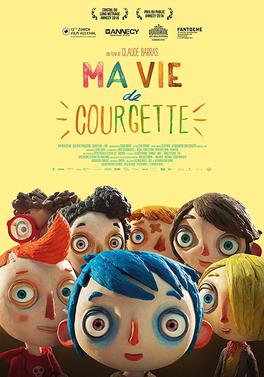My Life as a Courgette
| My Life as a Courgette | |
|---|---|

Film poster
|
|
| Directed by | Claude Barras |
| Produced by | Armelle Glorennec Éric Jacquot Marc Bonny |
| Screenplay by |
Céline Sciamma Claude Barras Germano Zullo Morgan Navarro |
| Based on |
Autobiographie d'une Courgette by Gilles Paris |
| Music by | Sophie Hunger |
| Edited by | Valentin Rotelli |
| Distributed by | Gebeka Films |
|
Release date
|
|
|
Running time
|
66 minutes |
| Country | France Switzerland |
| Language | French |
| Budget | $8 million |
| Box office | $5.5 million |
My Life as a Courgette (French: Ma vie de Courgette; also titled My Life as a Zucchini) is a 2016 Swiss and French stop motion animated comedy-drama film directed by Claude Barras. It was screened in the Directors' Fortnight section at the 2016 Cannes Film Festival.
This is the second adaptation of Gilles Paris' 2002 novel Autobiographie d'une Courgette, as there was a French live-action television film adaptation called C'est mieux la vie quand on est grand which aired in 2007.
The film has been nominated for the Best Animated Feature Film at the 89th Academy Awards. It was also selected as the Swiss entry for the Best Foreign Language Film at the 89th Academy Awards, making the December shortlist.
A little boy finishes drawing a kite on the floor of a house filled with empty beer cans. He then stacks the cans to make a pyramid, but the heap eventually collapses and rolls down the stairs. On the ground floor, a drunken old woman watches a sentimental series on television. She is the mother of the little boy, whom she calls "Courgette". At the sound, she gets angry and starts climbing the stairs leading to the floor, telling the boy that she will beat him. Frightened, the boy brusquely closes the trapdoor on the head of his mother who falls on the stairs and does not move any more. At the police station, a policeman, Raymond, takes the deposition of the little boy. He is called Icare, but prefers to be called Courgette. He no longer has a father, but he drew him on his kite, which never leaves him. Raymond explains to Courgette that his mother "went away" and that he is going to take him to a place where children like him, who have neither father nor mother: an orphanage.
At the orphanage, Courgette lives in a common room with several other children. He is timid at first, and is mocked by Simon, a boy who has ascendancy over all the others. Simon laughs at his name and wants to force him to say what happened to his parents. But when Simon steals the kite from Courgette and Courgette fights to get it back, the two boys finally become friends. Simon explains to Courgette that his parents use drugs all the time. He tells about the parent of the other children: madness, deportation for lack of papers, murder, prison for offense, pedophilia ... But all the children are in the same case: "We have no one to love us". The children themselves have symptoms of their traumas: one is always peeing in bed, another calls out to her mother every time she hears a car come in, another sometimes has an obsessive compulsive disorder, etc.
...
Wikipedia
